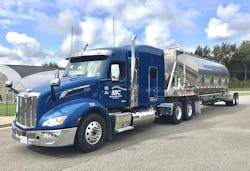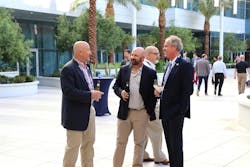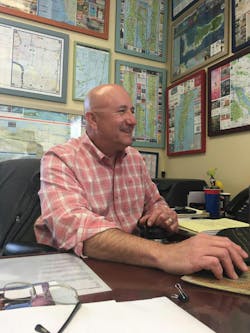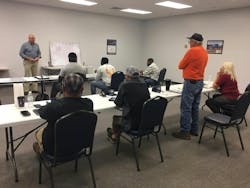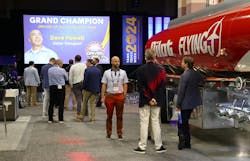Best man: ABC VP leads NTTC in ‘interesting’ times
Ward Best was ready for a change.
He and wife Shannon had recently welcomed their first son, Camden, so she wanted to move closer to home, and he wanted a new career. Fortunately for them, providing solutions is a life-long passion for Shannon’s dad, Gary Short, the 82-year-old CEO of Atlantic Bulk Carrier (ABC), which Short founded in 1971 in Providence Forge, Virginia. “Gary and I met, and we agreed he would hire me, and we could try it out,” Best recalled. “And if it didn’t work, we’d part ways without any hard feelings.
“We’re still waiting to see how that turns out.”
Best’s signature quips aside, it was the best decision ABC could have made.
The carrier ran only 32 trucks when he joined the family business in 1996. Today, he’s the vice president of a leading bulk hauler that has 200 tractors, 750 trailers, and 200 employees, including Camden, now 29. And the guy who jokingly insists he couldn’t spell “tank truck” when he started also now serves as National Tank Truck Carriers’ 77th chairman—one of the industry’s most prominent positions.
“It’s been an absolute honor to have him,” said Ryan Streblow, NTTC president and CEO.
“Ward not only is well-connected politically, he has a leadership mindset when it comes to advocacy. So, in a time when we were shifting from a focus on the economy, and trying to right the ship, to a workforce-focused effort—and with it being an election year—Ward helped steer the association in the right direction by focusing on the advocacy side, and make sure we’re considering every angle.”
Upward trajectory
Best began his ABC career as a mechanic, changing tires and greasing tanker chassis. But he progressed quickly and rose to president of Atlantic Tank Lines in 2003, when ABC separated its hazardous and non-hazardous services for liability purposes. Four years later, he rejoined ABC as VP after leaders decided the savings didn’t justify the inefficiencies. “I thoroughly enjoyed doing that, and we had success, but we felt we could be more successful by reintegrating the two companies,” Best explained.
The wholly owned operation now hauls liquid and dry bulk products, including plastic pellets, aggregates, and water treatment chemicals, across the United States, with a focus on shippers in the Southeast. “Growth, for us, has never been a straight line,” Best said. “When I came on board, we had a much tighter footprint. Then as we expanded operations, we opened terminals farther and farther outside that footprint. Some of those we’ve grown, but others subsequently closed. So it hasn’t all been straight-line, continuous growth, but we’ve maintained an upward trajectory, increasing steadily in size and scope.
“It’s still an open question as to how much farther we want to venture out of the Southeast, but we’re fortunate this region is one of the fastest growing in the nation, and that includes population and manufacturing activity.”
While helping grow the third-generation family business—which includes brother-in-law Mark Short, ABC president; and sister-in-law Jeniffer Zaun, who oversees payroll and benefits—Best has been actively involved with NTTC since the late 1990s, when he became a registered hazmat cargo tank inspector through the association’s Tank Truck University while still working under longtime ABC shop foreman Jerry Oliver. Best also was appointed chairman of the Virginia Trucking Association in 2019.
“These associations bring untold value to our industry,” Best said. “More carriers need to recognize that—and participate.”
Best’s participation will continue long after this 2024-25 chairmanship ends, and he hands the reins to David Price, United Petroleum Transports vice chairman. But before moving on to the next opportunity, Best visited with Bulk Transporter for our annual “State of the Industry” address, covering everything from ABC’s growth and market expectations to ongoing challenges and the Trump administration’s impact.
Questions and answers are edited for space and clarity.
Bulk Transporter: What sets ABC apart from other tank truck carriers?
Ward Best: “We’re family-owned and family-run, and we find that many drivers are looking for that family feeling when they’re searching for a home. Tank truck drivers and technicians are highly skilled and sought after, so any advantage we have benefits us. And our employees benefit because they have unrestricted access to the folks who own and run the company. Gary Short still comes into work regularly.”
BT: How did ABC fair in 2024?
WB: “As with many tank truck carriers, the past few years have been challenging. Economic conditions have made it a struggle and the workforce has undergone a radical change since the Covid pandemic. Luckily, I believe tankers have fared better than the general freight market. I’m still very active in the Virginia Trucking Association, so I talk with folks from different sectors of the industry on a regular basis. And I’m hopeful and more optimistic about this year, so we are actively working to position ourselves for improved conditions.”
BT: Is there a segment where you see the most potential for growth?
WB: “Different opportunities present themselves at different times, and in different areas. So we try to stay open-minded and look for those opportunities and position ourselves to be able to take advantage of them. And we’ve diversified our operations to do that. We run both liquid and dry hazardous and non-hazardous products. Now, we don’t do food-grade. That’s a different world. And unlike a lot of NTTC members, we don’t haul any fuel. But that still leaves a broad swath of the market that is moving liquid and dry bulk materials we can handle, which gives us opportunities others may not have.”
BT: With uncertainty in the energy sector, many carriers have pursued growth in chemicals in recent years. Do you see that continuing?
WB: “When I started, many years ago, there was a whole lot of chemicals coming out of the Northeast. And I very specifically remember picking up loads in the Philadelphia and New England markets and bringing them back to the South. A lot of that has moved. It’s either going on rail or into holding and transload sites closer to the final delivery point in the Southeast. So that modification has already occurred, and those types of things will continue to happen as the labor market, economy, and population shift. So it’s incumbent upon us, and anyone else out there, to be familiar with those changes, and be able to react to them accordingly. The only constant in trucking is change.”
BT: Speaking of changes, we saw a big one in January. I think most tank truck carriers are optimistic about how the Trump administration will impact operations, especially regarding zero-emission vehicle adoption timelines. What do you think?
WB: “We’re certainly at an inflection point. Most people I’ve spoken with in the industry at large have a positive outlook about the administration change, so they’re hopeful, but we must continue to stay on top of our iniatives. With the electrification of trucks, we’re not opposed to the advancement of technology. As a matter of fact, we’re the biggest cheerleaders for that. What we oppose is the impractical headlong rush to push this technology out before it’s ready, before we have any infrastructure on the ground, and without any commonsense guidelines in place.
“So we’re asking for a reevaluation. We want folks to look at this issue very critically and come up with a good-faith assessment of how and when this should happen. Electrification might not be the best path forward. It might be alternative fuels, like renewable diesel, or maybe hydrogen, or any number of different things. We should not be forcing a single solution on very disparate organizations and industries.”
BT: Can you at least breathe a sigh of relief on emissions regulations?
WB: “It’s something we must keep an eye on because there are folks who are not well-enough educated on this issue, and their decision making is confounding. As I’ve said, we are supportive of technological advancements. And the folks I know within the industry are probably better conservationists than most people, because we hunt and fish, we’re property owners, and we want to conserve that for our children and grandchildren. So, I believe some reins have been thrown on it, but it isn’t fully out to pasture yet. It’s something we need to continue watching for the next couple of years at least.”
BT: Tort reform is another strategic priority for NTTC. Do you expect to make any progress in that arena in the next few years?
WB: “Unfortunately, I believe tort reform is going to be slow and torturous to get accomplished. There are great forces on the opposing side. A lot of plaintiff’s attorneys make a whole lot of money from this. There are now investments going into some of these lawsuits from folks who have zero connection to the industry or anybody who may have been injured, yet they’re financing these cases in hopes of a nuclear verdict and big payday. So there are forces aligned against us, and those folks, I’m afraid, are aligned against common sense in many instances. I’ve never met anyone in this industry who is cavalier about safety on the highways and protecting everybody out there. So that’s a hard discussion to initiate on the state and federal levels, but it’s something we must continue to push for, because these suits are an existential threat to every company operating out there on the road.”
BT: Overall, how do you characterize the state of the tank truck industry today?
WB: “The first thing I would say is I’m glad we’re not hauling general freight. I have a number of friends on the state level in that arena, and they’re howling at the conditions they’ve endured for the past couple years. The tank truck industry is a little bit insulated. The overall economy is still going to affect what we do on a day-to-day basis, but I’m optimistic going forward, and I think the folks who’ve positioned themselves correctly, and been more conservative in their operations, will come out of this stronger when things turn.”
BT: Will technology continue to play an increasingly important role in safety and profitable operations?
WB: “I’m going to fall back on my earlier statement and say the one constant is change. So the folks who are going to do best are the ones who are able to embrace technology and use it to their advantage. I do believe artificial intelligence is going to impact what we do. I’m hopeful it allows us to be more efficient in our operations, and maintenance, etc. And the autonomous vehicle issue has been around for a while, in discussion, and we’ve seen advancements. I’m a fan of what’s being done in that arena, but I believe autonomous vehicles in the Class 8 space are many years away. And when it comes to the tank truck industry, I don’t know when we’ll ever get public acceptance for an unmanned tanker driving down the roadway.”
BT: What new technology or equipment has been most helpful to tank truckers?
WB: “In-cab cameras have been a game-changer for the trucking industry. We do not employ inward-facing cameras for a number of reasons, but we adopted forward-facing cameras several years ago. I don’t know that we have a driver who would want to drive without a camera now. We also spec Bendix Wingman on all our new vehicles. Previously, we had the collision-avoidance warning system Vorad in our vehicles. That was a great coaching tool we used. I was disappointed when that was taken off the market, but happy to see a radar-based system return as a foundation of the collision-mitigation technology in Wingman.”
BT: You’ve been active with NTTC and VTA for many years. ABC also is involved with American Trucking Associations and the South Carolina Trucking Association. Why is it so important to stay engaged?
WB: “Who I am at work, and what I do, is largely due to the knowledge I have gained through participation in the VTA and, more so, the NTTC because we are a tank truck carrier. I started on the maintenance side and then moved into safety, and the education and training available through these associations and, more importantly, the contacts I’ve made through them, have been invaluable to me. A recent ATRI [American Transportation Research Institute] study proved what we already knew: Companies who are active in state and national associations are safer and better companies.”
BT: NTTC is celebrating its 80th anniversary this year. How special is that milestone?
WB: Congratulations to the National Tank Truck Carriers association. Because of the hard work by the current staff—and they are a great group of people—and the work of my predecessors, the NTTC is in solid financial shape. The 80-year history of the association is a testament to the people who make us this special segment of trucking, and their wisdom in recognizing the common bonds we have and the necessity of working together to better our industry. I know the incoming chairman, David Price, and several people behind him, so I know the association is in good hands going forward.”
BT: Do you have any advice for the incoming NTTC chair?
WB: I’ve gotten to know David pretty well over the over the past couple years, and I enjoy sitting down and talking to him. He’s one of the many people in the association I count among my friends, so I wish him nothing but the best. And I really hope his time as chairman will be a little less interesting than the one I’ve been serving in.”
BT: Has your chairmanship been everything you expected?
WB: “Serving as NTTC chairman has been a great honor for me. I mean that sincerely. It has also been a commitment beyond what I initially anticipated—but the rewards have been commensurate. I wouldn’t trade this experience for anything.”
About the Author
Jason McDaniel
Jason McDaniel, based in the Houston TX area, has more than 20 years of experience as an award-winning journalist. He spent 15 writing and editing for daily newspapers, including the Houston Chronicle, and began covering the commercial vehicle industry in 2018. He was named editor of Bulk Transporter and Refrigerated Transporter magazines in July 2020.


